It seems we can’t find what you’re looking for. Perhaps searching can help.
Sign Up for newsletter!
Subscribe to get the latest eBook!
Hotline






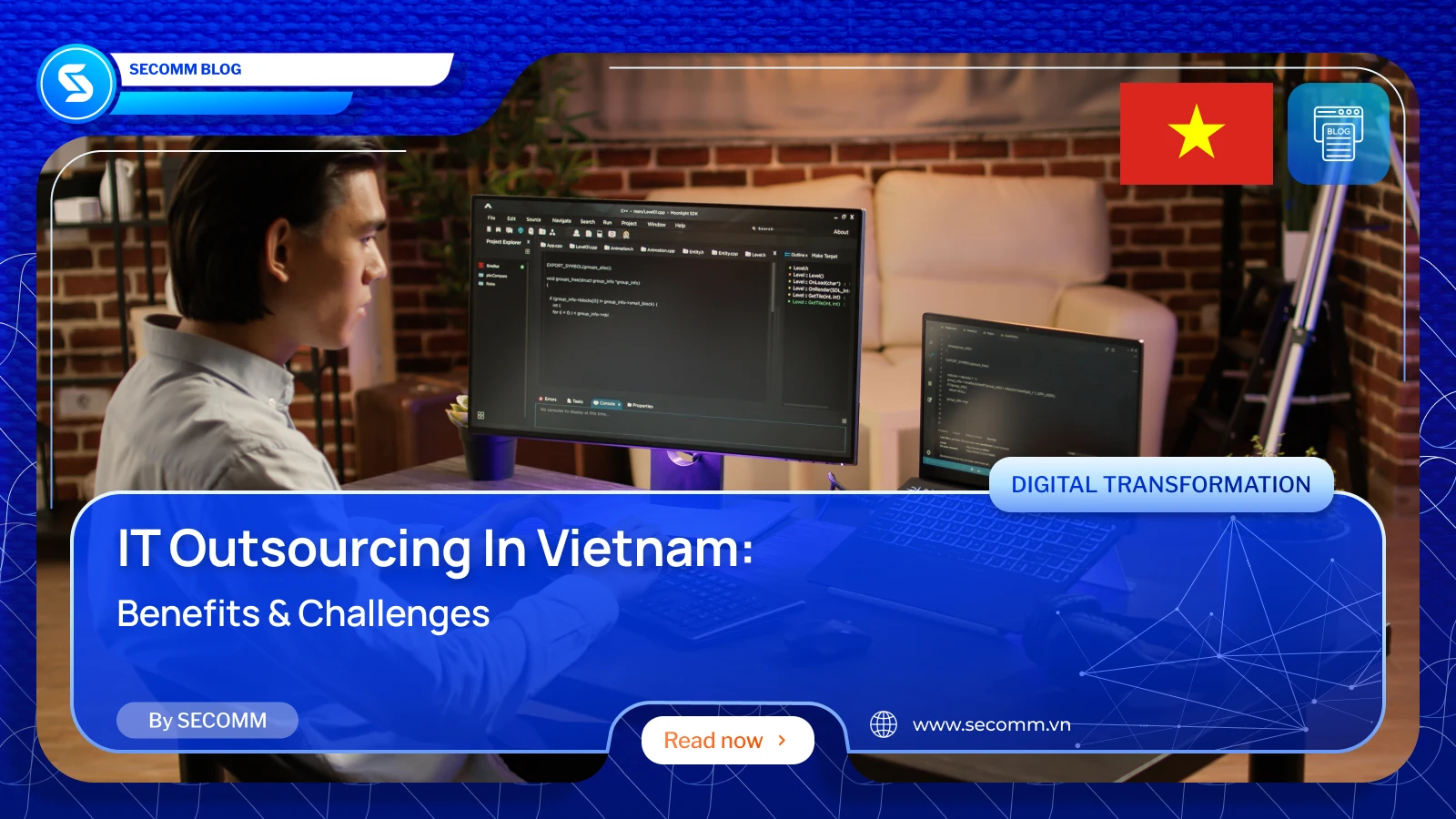
IT outsourcing has become a prevalent strategy in today’s business landscape, offering several advantages such as cost savings, access to specialized expertise, and operational agility. For years, Vietnam has stood out as a prime destination for IT outsourcing due to its favorable business ecosystem, competitive labor costs, and government support.
In this blog post, SECOMM explores why Vietnam is an ideal choice for businesses seeking to outsource their IT requirements. We’ll delve into the country’s strengths and potential drawbacks, providing valuable insights for decision-makers.
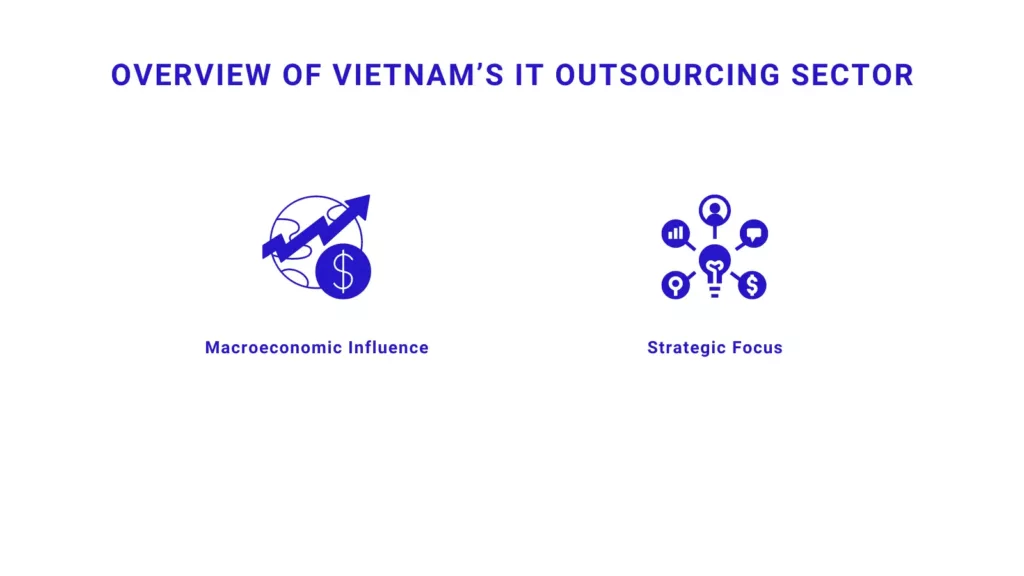
Vietnam’s dedication to advancing science and technology has led to a flourishing ICT market, valued at $7.7 billion in 2021, with ongoing growth fueled by digital adoption in both the public and private sectors.
Macroeconomic Influence: Vietnam has emerged as one of the fastest-growing economies globally, buoyed by a stable political environment and government support for the IT industry. Furthermore, rising investments in cutting-edge technology and startup funding fuel the market’s expansion.
Strategic Focus: According to the International Trade Administration, the Vietnamese government recognizes Information and Communication Technology (ICT) as a pivotal industry and a driver of socio-economic progress. Additionally, Vietnam’s commitment to core tech advancements is evident through significant investments in AI and cloud computing by the government and major companies.
Due to the above elements, the IT outsourcing industry in Vietnam is growing rapidly with an impressive annual growth rate of 16.38% from 2024 to 2028, resulting in a substantial market volume of US$1,282.00 million by 2028.
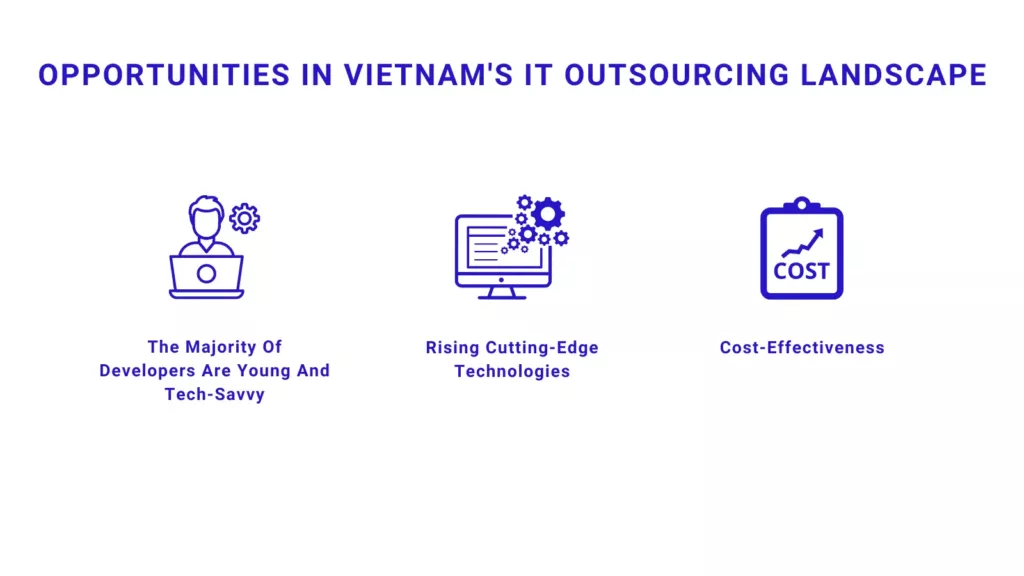
Around 56% of developers fall within the 20 – 29 years age group, this number is expected to form about one-third of Vietnam’s workforce by 2025.
There are approximately 50,000 to 57,000 students who graduate in university IT programs annually. Due to this, Vietnam was ranked among the top 10 globally for IT graduates and the top 6 for quality software services. TopDev’s 2023 report highlights that Vietnam’s robust community of around 530,000 tech professionals is well-suited to meet the varied demands of international businesses.
Moreover, the Ministry of Education and Training manages IT education in Vietnam. Recent changes have allowed more flexibility in higher education institutions to encourage innovation. For instance, separate entrance exams for each institution have been eliminated, resulting in improved admission rates.
Cloud computing in Vietnam has grown at a 30% CAGR recently, driven by robust IT infrastructure and data centers. This progress aligns with Vietnam’s digital transformation agenda. Moreover, with the aim of data security, many Vietnamese companies prefer “make in Vietnam” cloud computing services to foreign ones.
Vietnam has also made strides in artificial intelligence readiness, moving from 55th to 39th globally. It ranks 9th in East Asia and 5th in ASEAN, with an AI readiness score of 54.48.
In 2023, the average monthly salary for developers with fresher-level salaries at $514 and for director-level salaries at $2,680. Overall, the annual salary of a Vietnamese IT developer is $7,173, which is incredibly low, it only amounts to nearly 25% of Chinese wages ($29.840) and around 35% of Indian wages ($20.464). These cost benefits, coupled with a commitment to high-quality workflows, are making Vietnam an increasingly popular choice for international organizations seeking dependable and affordable IT services.
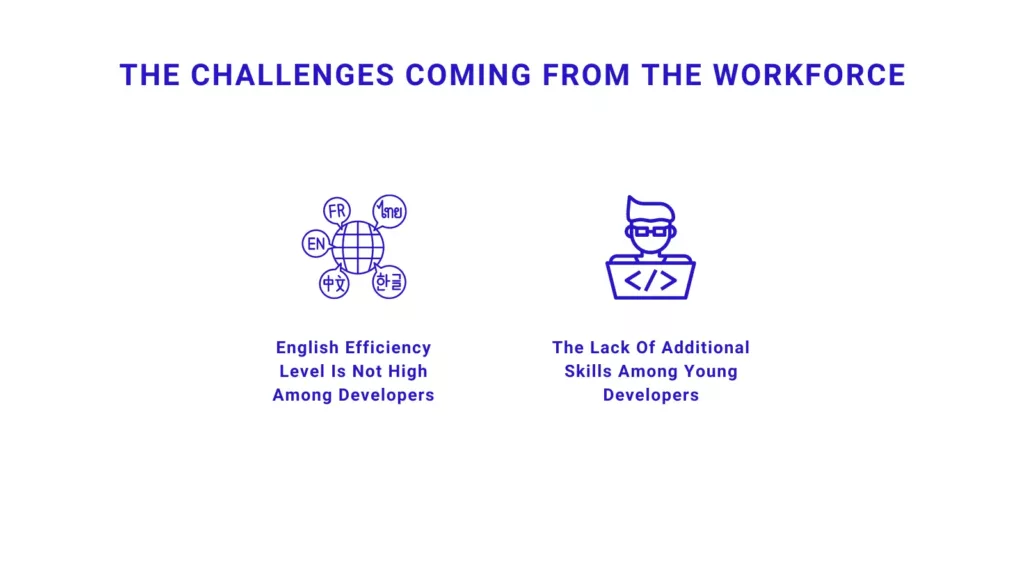
The IT sector’s language requirements are becoming stricter, with over 9% of foreign companies seeking IT staff with professional English skills. The demand for English proficiency has shifted from a nice-to-have to a must-have. Although Vietnamese tech professionals have strong technical abilities and can communicate effectively, their English-speaking skills may not be as advanced as those in other ASEAN countries.
In 2022, only 5% of Vietnam’s workforce was fluent in English, which is less than the fluency rates in Indonesia (10%), Malaysia (21%), and Thailand (27%). This has caused a challenge in the recruitment process for IT outsourcing that many skilled developers are getting denied due to their English level.
Additionally, the new generation of developers, mainly Gen Z, is experiencing a growing skills gap because of the fast-paced technological changes. Yet, an impressive 72% of them are keen to learn digital skills, which is higher than the global average of 52%. This enthusiasm is a positive sign for the future, showing they understand the challenges and are ready to tackle them.
Upon engaging with SECOMM, you will gain access to a dedicated IT team that meets standards in English proficiency and technical competency. Book your FREE consultation with SECOMM’s experts today.
Explore SECOMM’s project: Assembling a Specialized Vietnamese IT Team for LandNow’s Website Development.
3. To Sum Up!
Vietnam’s IT outsourcing market has seen consistent growth, thanks to significant investments from both the government and foreign companies. If you’re seeking an IT team provider in Vietnam, consider SECOMM. Their exceptional talent can drive innovation and elevate your business objectives. Reach out to SECOMM at (+84) 28 7108 9908 to explore a partnership.
 4
4
 3,899
3,899
 0
0
 5
5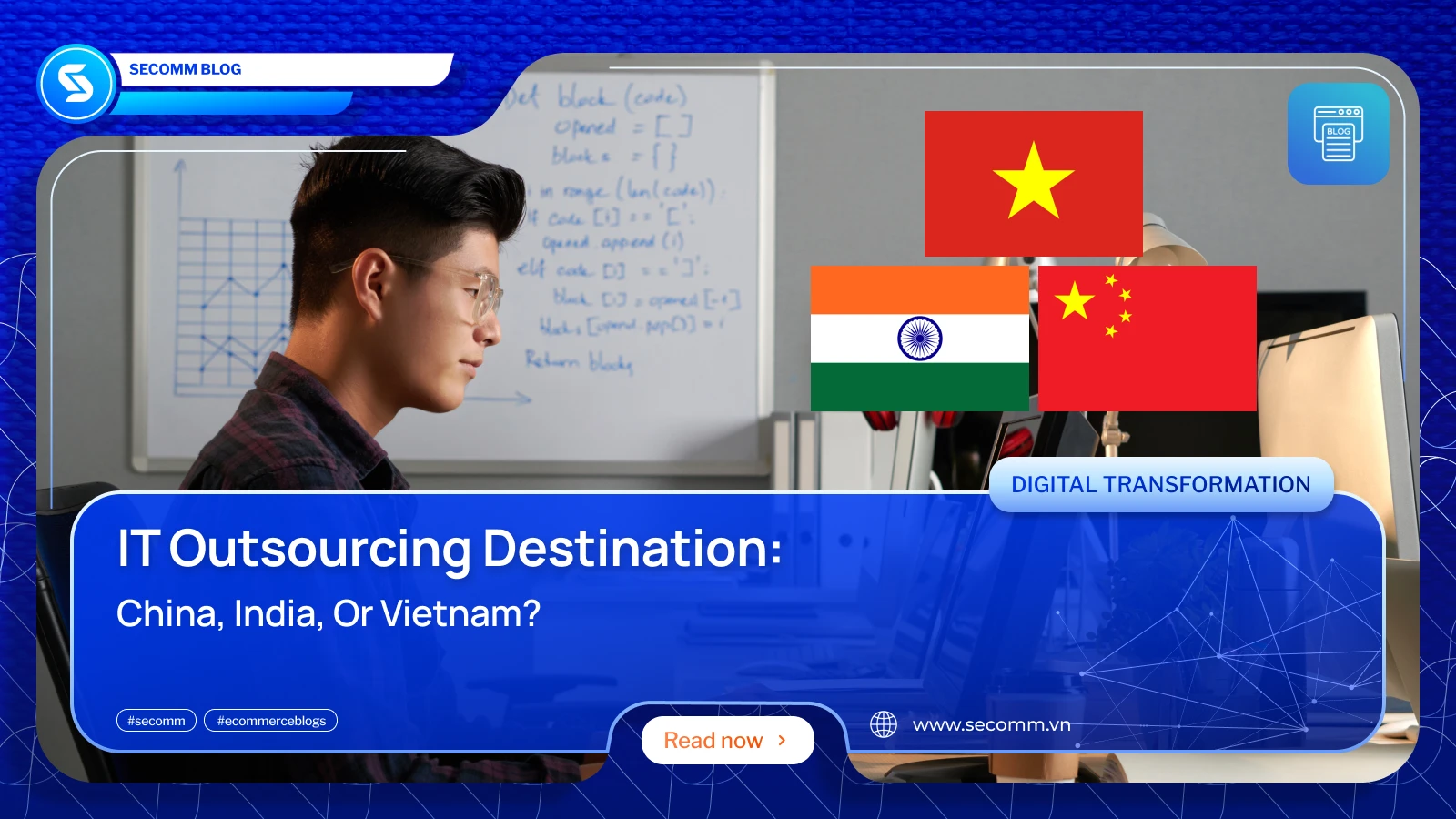
The IT Outsourcing market worldwide is projected to grow annually by 10.99%, reaching a market value of US$777.70 billion by 2028.
While India and China have long been the go-to nations for IT dedicated teams, new players like Vietnam are gaining ground. Companies have various choices based on language, cost, culture, and government support.
In this blog, SECOMM will explore the advantages and disadvantages of outsourcing IT functions to India, China, or Vietnam. This analysis will help companies make informed decisions about which country aligns best with their resources and strategic objectives.
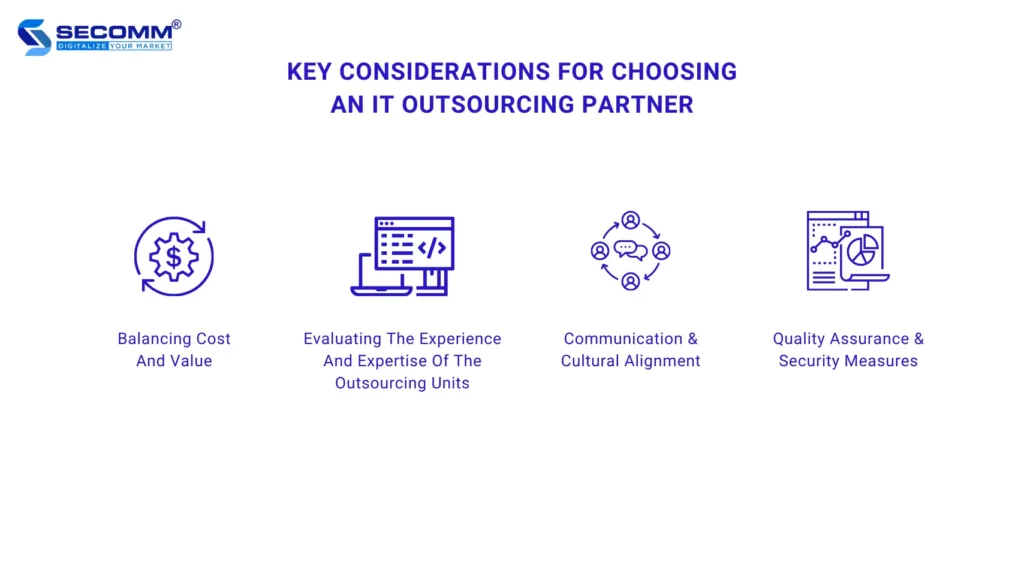
Before going further into the main points of the three countries, there are some key points that companies should be aware of when choosing an IT outsourcing partner.
Selecting a partner who can provide both quality and competitive pricing is vital for the company’s campaign success. When assessing cost benefits, look beyond immediate savings. Consider the long-term expenses of communication, travel, staff turnover, and management tasks. These factors can impact your financial outcomes over time. For example, a company outsourcing to a country with low English proficiency may lead to communication challenges. To address this, the company might need to employ a local translator to ensure smooth operations.
A Deloitte study reveals that 59% of companies outsource software development for specialized skills and expertise. It’s important to choose partners known for providing skilled IT professionals and delivering projects akin to yours. Experience in similar projects or industries is a plus, as partners with relevant domain knowledge can offer valuable insights and tailored solutions. For example, in Vietnam, SECOMM is one of many companies proud of its ability to handle big projects globally easily due to its past experiences of working with many big names in the eCommerce industry.
Cultural alignment and good communication are important but often ignored in outsourcing partnerships. Your partner should have values, work ethics, and communication methods similar to your company’s. Communication should be transparent and frequent throughout the project. Choosing a partner with staff who speak a language that both parties understand is important to avoid language barriers that could slow down progress.
Quality control is vital for software that’s free of bugs. Your outsourcing partner should follow the best practices in data security and software development. Quality assurance tests should be part of the development process to catch and fix issues early. Security is equally important for outsourced DevOps services. Check their security measures, data protection policies, and compliance with industry standards. They must protect sensitive data according to industry regulations and have clear methods for protecting intellectual property and confidential information.
Outsourcing to China is a strategic choice for many Western companies, largely due to the cost-effective services and access to a highly skilled workforce. China’s e-commerce market is the largest globally, and the country offers a stable economic environment, low corporate taxes, and numerous top-tier seaports. Moreover, China boasts one of the world’s largest and most proficient tech talent pools, adding to its appeal as an outsourcing hub.
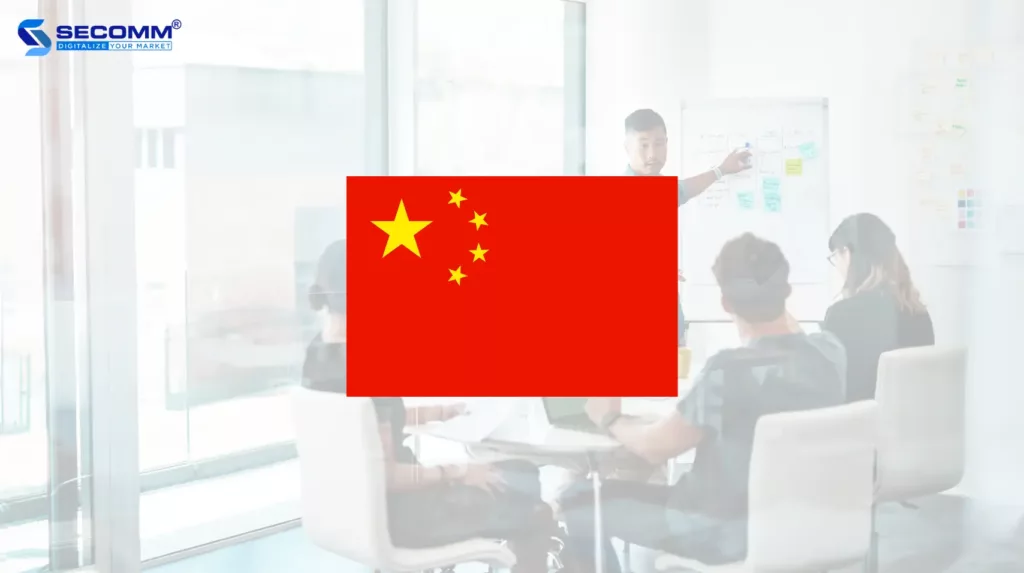
Outsourcing IT to China offers clear financial benefits. Chinese developers provide services at competitive rates, which can lead to significant cost savings for businesses. This affordability doesn’t come at the expense of talent, as China has a large pool of skilled developers. The salaries for these developers are generally lower than in the US where Chinese professionals often charge around $50 to $100 an hour, with an average of around $29,840 a year.
Moreover, China is a leading tech hub with one of the largest and most skilled IT dedicated teams in the world. By 2024, the global number of developers is expected to reach 28.7 million, with China contributing significantly to this growth. The country’s developer population is growing at a rate of 6% to 8%. China also prioritizes high-quality education, with 24 of its universities ranked among the top 200 worldwide. The Chinese government is actively launching educational initiatives to enhance technical skills, preparing its citizens for the evolving digital world.
The government invests in projects and infrastructure to aid these companies and streamline outsourcing. In 2020, China announced a massive $1.4 trillion investment to enhance public digital infrastructure. This investment is a boon for companies considering China for digital outsourcing, as it simplifies the integration of local talent.
Additionally, there are still some issues that companies need to be aware of when contacting the IT dedicated team in China. Firstly, language barriers are significant when outsourcing to China, as not all IT professionals are proficient in English, potentially causing miscommunications and project delays. Cultural variances can also affect how communication is perceived and managed.
Additionally, on the topic of intellectual property, China’s laws may vary from those in other nations, posing a risk to the security of your ideas. Moreover, stringent data privacy and security regulations by the Chinese government can pose operational challenges for foreign IT service providers.
India has consistently been a dominant force in the global IT outsourcing sector, attributed to its extensive talent pool of IT experts and a favorable business ecosystem. The industry is projected to witness a compound annual growth rate (CAGR) of 17.58% between 2024 and 2028, culminating in a projected market value of USD 20.09 billion by 2028.
Clients within India’s IT outsourcing market demand cost-effective, high-caliber services. They seek partnerships with firms that offer comprehensive services, including software development, maintenance, and support, and value providers with industry-specific experience who can deliver solutions tailored to their precise needs. Additionally, India is ideal for businesses seeking experienced developers with strong communication skills for complex projects.

Local outsourcing providers efficiently manage the entire process, including procurement, installation, and testing, ensuring a cost-effective and seamless experience. For example, establishing a website or developing a mobile application can be expensive, but outsourcing to India can reduce these costs by nearly 50%.
Furthermore, India’s lower living costs result in more affordable labor compared to countries like the United States. To illustrate, the average yearly salary for an IT employee based on Glassdoor in India is around $20,464, starkly contrasting the U.S. average of $109,829.
The country’s diverse population contributes to a workforce that includes programmers, scientists, financial experts, MBAs, journalists, and virtual assistants with exceptional skills.
India’s government-funded higher education system is the third-largest globally, after the US and China. According to Statistica, India has over 6.5 million graduates each year, significantly more than the Philippines, which is a major competitor in the BPO and outsourcing sector.
While Indians are proficient in English, the accent may sometimes lead to misunderstandings in verbal communication. It’s advisable to conduct most communication in writing, through emails and chats, to reduce miscommunication risks and maintain a written record for reference if needed.
In software development and IT, the risk of intellectual property (IP) being copied is significant. Without proper safeguards, there’s no guarantee of protection, as projects might be resold.
To protect your interests, it’s wise to sign an NDA with your outsourcing partner. Be careful with IP issues and consider getting legal advice for big projects with substantial financial stakes.
Vietnam has gained prominence in the IT outsourcing industry over the last ten years. It’s now a significant force globally, with a focus on software development, digital content, and BPO. The growth of Vietnam’s IT outsourcing sector is attributed to its youthful, talented workforce, competitive labor costs, and supportive government policies. Plus, its strategic position in Southeast Asia adds to its appeal as an outsourcing hub for regional and international businesses.

Outsourcing to Vietnam offers a key benefit: access to skilled tech talent at affordable rates. Vietnam, located in one of the world’s most cost-effective regions, has leveraged this to become the 6th top destination for software development. In 2022, Vietnam was rated 99.6/100 for low manufacturing costs by US NEWS and is among the lowest in Asia.
This results in significantly reduced IT outsourcing costs compared to other countries. For instance, the average annual income for a developer in Vietnam is approximately $7, 173, which is the lowest among the three. This represents a cost reduction of up to 94% compared to the US, 65% compared to India, and 76% compared to China.
Vietnam’s pool of highly educated and tech-savvy young professionals, many of whom have studied or worked abroad, makes it an attractive destination for outsourcing. Additionally, Vietnam offers technical training in various programming languages through its universities and technical schools, producing around 400,000 IT engineering graduates and 50,000 IT students annually.
Overall, Vietnam is well-equipped to meet the skilled workforce demands of employers seeking outsourcing opportunities, with a lower turnover rate compared to other countries in the field. Companies in Vietnam experience an IT-related turnover rate of less than 5%, making it an appealing choice for businesses.
Major multinational companies and tech giants, including Intel and Microsoft, have established a strong presence in Vietnam by outsourcing software development and IT support services. Additionally, other firms like IBM, Cisco, and Bayer are also expanding their IT roles in Vietnam.
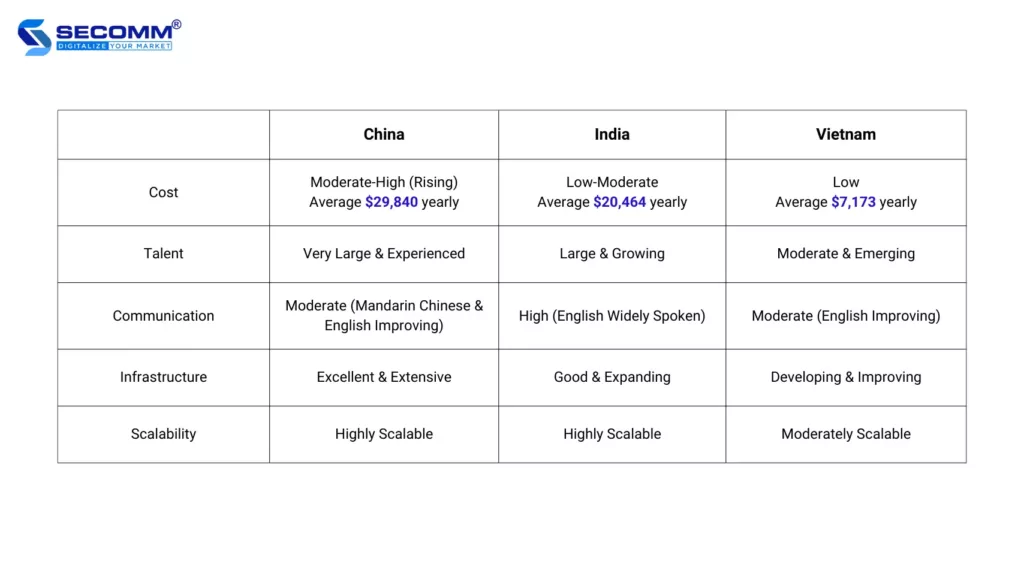
The involvement of these esteemed organizations serves as a testament to Vietnam’s adeptness in managing substantial outsourced or offshore software development initiatives, despite its status as a relatively small emerging nation in contrast to larger, more developed counterparts such as India and China.
Overall, China’s large, albeit aging, labor force and developed infrastructure are offset by rising costs and regulatory concerns. While India shines with its vast, young talent pool, cost-effectiveness, and robust infrastructure, making it a strong contender for scalability and quality. Finally, Vietnam emerges as a compelling choice with its youthful, tech-savvy workforce, competitive costs, and rapidly improving infrastructure.
Read more: IT Outsourcing in Vietnam: Benefits and Challenges
SECOMM stands out with over a decade of experience for organizations seeking a reliable IT-dedicated team in Vietnam. Engaging with SECOMM means your IT projects are in the hands of exceptional talent, driving innovation and advancing your business objectives. To explore a partnership with SECOMM, reach out or dial the hotline at (+84) 28 7108 9908 for a collaboration that can elevate your IT capabilities.
 10
10
 3,344
3,344
 0
0
 1
1Subscribe to get the latest eBook!
Hotline